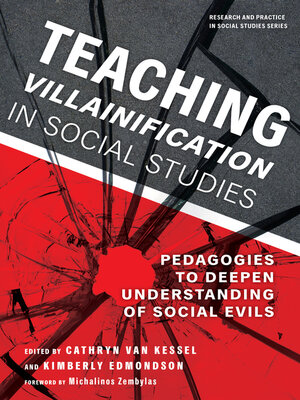Teaching Villainification in Social Studies
ebook ∣ Pedagogies to Deepen Understanding of Social Evils · Research and Practice in Social Studies
By Cathryn van Kessel

Sign up to save your library
With an OverDrive account, you can save your favorite libraries for at-a-glance information about availability. Find out more about OverDrive accounts.
Find this title in Libby, the library reading app by OverDrive.



Search for a digital library with this title
Title found at these libraries:
| Library Name | Distance |
|---|---|
| Loading... |
In this collection, scholars from the United States, Canada, and Australia examine the concepts of villainification and anti-villainification in social studies curriculum, popular culture, as well as within sociocultural contexts and their implications. Villainification is the process of identifying an individual or a small group of individuals as the sole source of a larger evil. Anti-villainification considers the messy space in between individual and group culpability in order to help students develop a sense of responsibility to each other as humans in communities on this planet. Chapter authors examine topics related to U.S. politics, financial education, Holocaust education, difficult histories, apocalypse fiction, the Marvel Cinematic Universe, technology use, LGBTQ school experiences, rape culture, geographies of invasion, and the female body. Taken together, these inquiries into villainification offer thoughtful and powerful insights for teaching about historical wrongdoing in more nuanced ways, addressing the responsibility we all have to create a better world.
Contributors:
Book Features:
"Encourages educators and students in the context of social studies education to delve deeper into exploring the nuanced aspects of contemporary and historical forms of evil." –From the Foreword by Michalinos Zembylas, professor, Open University of Cyprus







